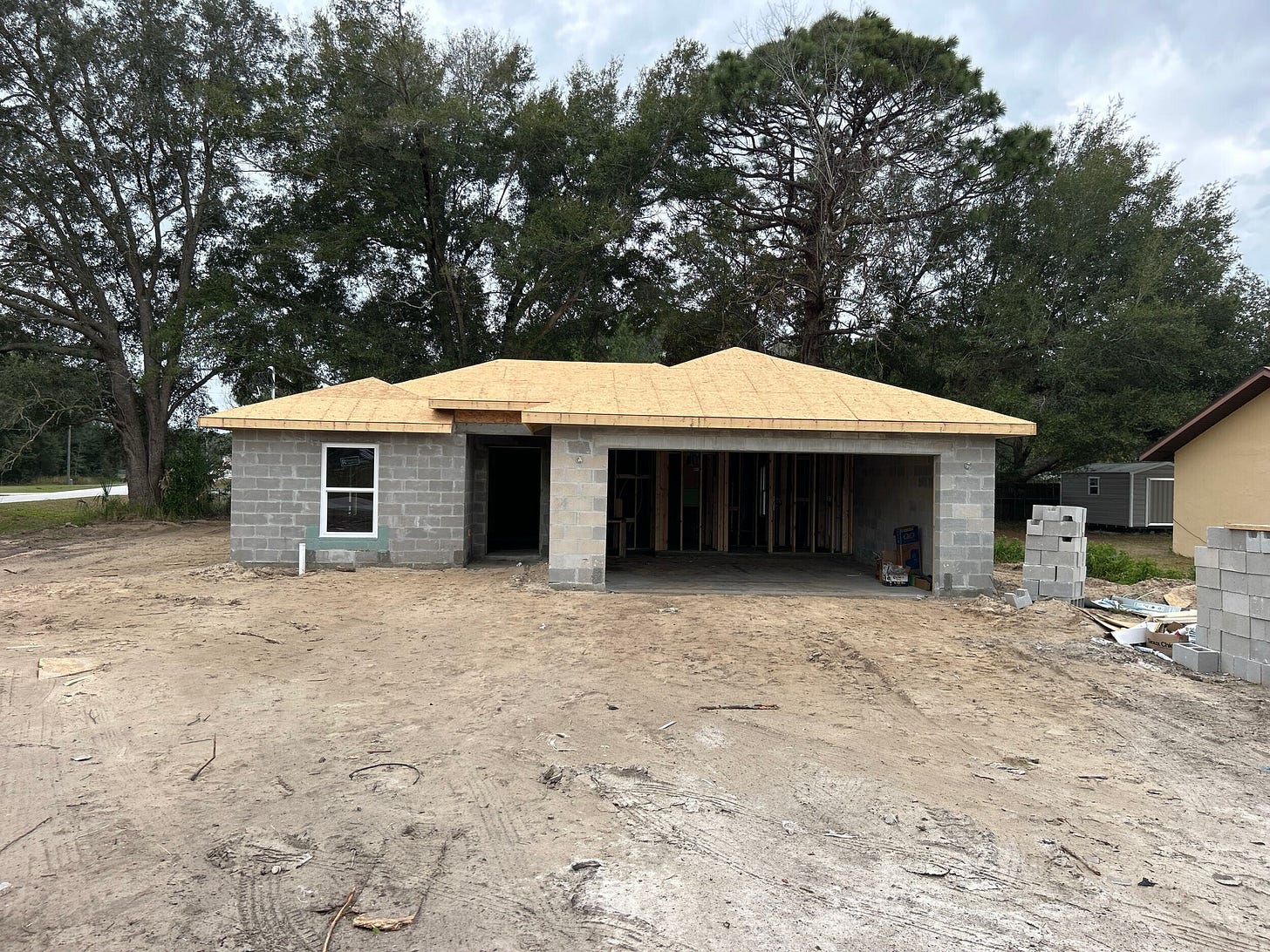Week 6: Why you should invest in real estate in 2024
Specifically in affordable housing
I spent last week at a financial event with multiple speakers ranging from Ray Dalio to Mike Pompeo (the former secretary of state). It was a wonderful week of learning about the several types of investments and how they function. It also opened my eyes to the current geopolitical landscape, what is happening in China, Russia, and the Middle East, and how it affects us economically. I learned a lot on this trip, but more importantly, it solidified my position in real estate. Specifically, the type that we are involved in build-to-rent affordable housing. More on that later.
This edition has the following sections:
Learning: Principles, How The Economic Machine Works by Ray Dalio
Adding Value: Affordable housing as an investment
Interesting things: Tweets
Other Stuff: New Acristo Engine Characters
Enjoy!
Learning:
Principles by Ray Dalio
"Principles" by Ray Dalio is a guide that outlines the core philosophies and strategies Dalio has employed to achieve remarkable success both in his professional life as the founder of Bridgewater Associates, one of the world's most significant hedge funds, and in his personal life.
The book focuses on Dalio's personal history and the foundation of his approach to life and work, the life principles that have guided his personal and professional decisions, and the management principles that have shaped Bridgewater's distinctive culture and approach to business.
A core belief in the book is that business and life can be systematized into rules and understood like machines. Throughout the book, Dalio offers insights on thinking critically, making better decisions, and approaching challenges with a clear, strategic mindset. The book encourages readers to reflect on their principles, adopt a growth mindset, and build a culture of shared values and purposeful pursuit of goals. It is a valuable resource for anyone looking to lead a more principled and practical life.
Below is an excellent video on how the economy works. I can't believe it's free to watch. Please check it out:
Residential Underwriting Course: How to Find and Analyze Deals
In a few weeks, I am doing a one-day workshop where I go in-depth on our process of analyzing residential land. An old saying in this industry is: "You make money in real estate when you buy." This class will give you the tools to "make money when you buy."
In this workshop, I will go over:
How to identify land
How do we decide whether we can make money in a market
What determines whether we will buy a piece of land
How we analyze the deal
How we estimate our costs
Land
Materials
Labor
Financing
This class will come with free one-year access to our underwriting tool, the Acristo Engine, which will help you underwrite deals quickly and accurately ($100 value). I am offering this class at a significant discount for my subscribers. It’d be foolish not to take up the offer.
Adding Value
Affordable housing as an investment
Like I said earlier, I was at a financial conference with some of the brightest financial minds in the world last week. One of the things we learned last week is that one of the ways to mitigate risk is to have 8-12 uncorrelated investments. Many believe that diversification occurs when they have a portfolio of stocks in different companies. Wrong, these stocks are all correlated. Much data suggests that all stocks in the stock market go up or down depending on the economy. Proper diversification occurs when you invest in entirely different asset classes, uncorrelated investments. An example of this is being invested in some stocks, ideally index funds such as the S&P500, some bonds, some gold, some alternate investments such as private equity, and some real estate.
Today, I would like to discuss how and why you should add real estate to your portfolio—specifically, affordable housing.
1. High Demand:
Interest rates have risen over the last year, which has slowed the housing market a bit. There is still plenty of demand, but affordability is the issue. On the rental side, there is an inventory shortage in the U.S., with many needing a home. According to the National Low-Income Housing Coalition, the country faces a shortage of 7.3 million affordable rental homes, meaning there are only 33 affordable and available homes for every 100 extremely low-income households.
On the other hand, potential buyers of homes face a similar issue. The overall housing market in the U.S. is experiencing a significant inventory shortage, which is expected to continue into 2024. This shortage is not limited to affordable housing. Still, it affects the entire market, making it challenging for buyers. The shortage results from years of under-building, compounded by the pandemic, which has led to supply chain disruptions, labor shortages, and rising material costs, hindering new home construction.
Overall, the demand for affordable housing is perennially high, driven by the ever-growing need for budget-friendly living spaces. This constant demand translates to lower vacancy rates and more consistent rental income for property owners, making it attractive for those looking to secure steady cash flow. The demand for the new generation and those looking to downsize to a smaller home is also high, providing an excellent opportunity for people to build and sell homes.
2. Appreciation Potential due to Rates:
Interest rates and home prices are negatively correlated. When one goes up, the other goes down. The exciting thing about the last year is that although rates have risen, prices have remained stable in areas with high growth and demand, such as the Florida and Texas markets. People who own homes there are unwilling to sell them for two reasons.
They like owning property/living there.
They secured their loans at lower rates. If they sold, they'd have to find another home and obtain a new loan at a rate twice as high as before.
The demand for housing is going nowhere in these markets. Furthermore, rates are believed to go down in the coming year. Realtor.com forecasts suggest that average mortgage rates could be around 6.8% for 2024, with a potential decrease to 6.5% by year-end, a modest improvement from the higher rates seen earlier. I believe this will lead to a barrage of people trying to secure these lower rates, driving prices up through the next few years. As cities expand and regenerate, affordable neighborhoods often see considerable growth in property values, providing investors with an excellent opportunity for capital gains.
Redfin authored an excellent article on the upcoming housing situation here.
3. Tax Advantages:
Investing in real estate also has the potential to lower your taxes. In 2022, I paid $0 in taxes despite earning almost a million dollars. I took advantage of a tax incentive called bonus depreciation to do this. Bonus depreciation is a tax strategy that allows businesses to immediately deduct a sizable portion of the purchase price of eligible assets rather than capitalize and depreciate those assets over time. Bonus depreciation was discontinued in 2023, but The House of Representatives recently passed the Tax Relief for American Families and Workers Act of 2024, which includes a reinstatement of 100% bonus depreciation for properties placed in service between 2023 and 2025. This is huge for real estate investors.
Even without bonus depreciation, investors can still benefit from regular depreciation, which offers a tax benefit for rental property owners, including those in affordable housing, by allowing them to deduct property wear and tear over 27.5 years, per IRS guidelines. Based on the property's cost minus land value, this deduction doesn't affect cash flow but lowers taxable income, boosting profitability.
Let's consider a hypothetical example of a $250,000 residential rental property to illustrate how depreciation might work in real estate:
Purchase Price Allocation: Assume the $250,000 purchase price is allocated as follows:
Land: $50,000 (not depreciable)
Building (Residential Property): $200,000
Depreciation Without Bonus: Typically, the residential rental property is depreciated over 27.5 years. Without bonus depreciation, the annual straight-line depreciation would be:
$200,000 / 27.5 years = $7,272 per year
With 100% Bonus Depreciation: If the property qualifies for 100% bonus depreciation (assuming it's placed in service before the end of the bonus depreciation phase-out period), you could potentially deduct the entire $200,000 in the first year of service instead of spreading it out over 27.5 years.
Tax Impact: The immediate deduction of $200,000 could significantly reduce taxable income for the year. For example, if the property owner is in a 24% tax bracket, this deduction could result in tax savings of:
$200,000 * 24% = $48,000
4. Accessible Entry Point:
One of the most compelling reasons to invest in affordable real estate is the lower barrier to entry. Compared to high-end homes, affordable homes require less capital upfront, making it an attainable investment for those just starting or looking to expand their portfolio without overextending their financial resources.
The sad truth is that you need capital to invest, usually lots of it. Last week, we learned about investing in private equity and the returns that it provides. The problem is the entry point for these funds is often in the millions of dollars to get your foot in the door, which is unattainable for 99% of the population.
Luckily, affordable real estate in the right markets can give you returns like private equity, and you can invest at a much lower price point with more freedom.
At my firm, Ordonez Construction. We build affordable housing with growth potential in Florida submarkets. We primarily build for ourselves using our proven system. Over the last year, we have offered limited opportunities for investors to participate in our projects by building homes for them or by investing passively.
For the building service, we use our existing systems to build homes for investors. The investor pays us a fee, and we take care of everything from finding the land to selling or renting the house for them. It is truly a white glove service.
For passive investors, we offer 8-12% annual returns on your money. We have hundreds of projects that need funding throughout Florida, where we build affordable housing and can deliver significant returns for investors. To this day, we have not lost any investor capital, always providing returns for them.
Later this week, I will send out our current investment opportunities to subscribers so they can apply to work with us this year. Spots are limited, so make sure to subscribe to get first access.
Keep reading with a 7-day free trial
Subscribe to Adan’s Newsletter to keep reading this post and get 7 days of free access to the full post archives.






